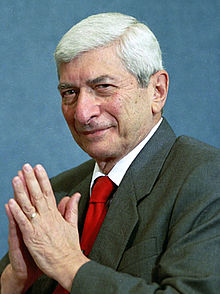The Road to War by Marvin Kalb | Books in Review
 In The Road to War: Presidential Commitments Honored and Betrayed (Brookings Institution, 280 pp., $29.95) veteran journalist and Harvard professor emeritus Marvin Kalb brings new depth of meaning to the adage “a man is only as good as his word” as he guides the reader through the political maze of the Vietnam War by focusing on the actions of American presidents that brought us into the war without a congressionally approved declaration of war.
In The Road to War: Presidential Commitments Honored and Betrayed (Brookings Institution, 280 pp., $29.95) veteran journalist and Harvard professor emeritus Marvin Kalb brings new depth of meaning to the adage “a man is only as good as his word” as he guides the reader through the political maze of the Vietnam War by focusing on the actions of American presidents that brought us into the war without a congressionally approved declaration of war.
Kalb’s easy-to-follow, well-documented book describes how Presidents Truman, Eisenhower, Kennedy, Johnson, and Nixon had at least three major Vietnam-War policy-making things in common: none had a clear plan for winning the war; all firmly believed in the Domino Theory; and none wanted to be known as the president who lost a war.
The book clearly shows that Congress exerted little of its power to influence the war one way or another—except to provide funds. Late in the Vietnam conflict, Congress passed the War Powers Act, which restricted the president’s ability to wage war longer than 60-90 days without congressional approval.
America’s participation in the war began with Truman’s commitment not to interfere when France decided to reclaim Indochina as a colony after World War II. Ho Chi Minh’s declaration of independence for Vietnam and overtures for cooperation with the United States fell on fear-deafened ears in Washington. Fears of communist expansion were fueled by the aggressiveness of the Russians and Chinese. Communist control of Indochina was seen as a threat to our national security.

Marvin Kalb
The United States became involved in the Korean War in the early 50’s. At that same time France was losing its war in Vietnam. Staying true to their commitments to fighting communism in that arena, Presidents Truman and Eisenhower sent military advisers, air support, and financial aid to bolster the French in Indochina. By the time of the defeat of France by the North Vietnamese in 1954, the United States was paying 75 percent of the bill.
While President Kennedy was reluctant to send combat troops to Vietnam, he did send thousands of advisers and huge amounts of weaponry. American pilots took part in combat missions. It was also at this time that reporters coined the term “the Americanization” of the war.
Disgusted at the corruption and ineptness of the South Vietnamese political leaders, Kennedy didn’t interfere with the 1963 removal (and assassination) of President Ngo Dinh Diem from office. When the military and political situations didn’t improve, Kennedy began to withhold funds from the war effort. Several weeks later, Kennedy was assassinated.
Wanting to stay true to the commitment to prevent the dominoes from falling in Southeast Asia, President Johnson chose to heed his advisers, who told him victory was still possible in Vietnam. Several others told him to cut and run as victory was impossible.
Instead Johnson widely escalated the war. Like his predecessors, LBJ did not want to be known as the president who lost the war. However, the stalemate in Vietnam and rising antiwar sentiment at home convinced Johnson not to run for re-election in 1968.
While the war did come to an end during the presidency of Richard Nixon, it took an additional five years of massive destruction, tens of thousands of deaths, and enormous expenditures. Searching for an honorable exit from Vietnam, President Nixon visited both China and Russia. He asked the communist leaders to help him find an honorable exit from the war. When the Paris peace negotiations fell apart, Nixon ordered the unrestricted bombing of North Vietnamese on a scale not seen since World War II.
In the end, however, when the North Vietnamese blatantly violated the terms of peace treaty, Nixon was unable to fulfill his commitment to help South Vietnam due in large measure to the Watergate scandal.
Marvin Kalb uses the last part of his book to describe U.S. commitments to other countries during the Vietnam War era, especially to Israel. Then, during the second Iraq War and the war in Afghanistan, Kalb points out that once again there is “no clear plan of action.”
President Obama has used the word “ironclad” to describe America’s defense commitment to the Israelis. Kalb suggests that it’s time for an official defense treaty with Israel. It would assure Israel—and its enemies—that the U.S. this time is finally serious about a commitment to an ally.
—Joseph Reitz

